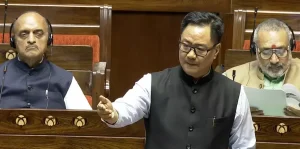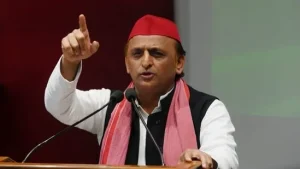New Delhi – The Lok Sabha is set to deliberate on the Waqf Amendment Bill today, a legislative proposal that has triggered intense political debate. The Bharatiya Janata Party (BJP) and the Indian National Congress have issued three-line whips to their Members of Parliament (MPs), ensuring full attendance. The Waqf Amendment Bill, which proposes significant changes to the management of Waqf properties, has encountered strong resistance from the INDIA bloc. The debate on Waqf Amendment Bill is expected to be one of the most contentious in recent parliamentary history, with implications for minority rights, governance, and religious institutions.
Background of the Waqf Amendment Bill
The Waqf Amendment Bill seeks to introduce major reforms to the existing Waqf Act, which governs the administration of Waqf properties in India. Waqf properties are religious endowments typically dedicated to the Muslim community for educational, charitable, or religious purposes. The Waqf Amendment Bill aims to modernize Waqf management by improving transparency, efficiency, and accountability in the administration of these assets.
The government argues that the amendments will address several issues, including alleged mismanagement and corruption in Waqf boards. The Waqf Amendment Bill proposes stricter guidelines for property registration, improved digital record-keeping, and enhanced oversight mechanisms. It also seeks to grant greater representation to women and non-Muslim members on Waqf boards, which the government says will promote inclusivity and fairness.
Government’s Position and Rationale


The ruling BJP has defended the Waqf Amendment Bill as a necessary reform to bring Waqf institutions in line with modern governance practices. The government contends that the current system suffers from inefficiencies, mismanagement, and lack of transparency, leading to the underutilization of Waqf assets. The proposed changes, according to government sources, will ensure that Waqf properties are used effectively for the benefit of the community.
Supporters of the Waqf Amendment Bill emphasize that reforms are in line with recommendations from several committees that have examined Waqf management issues over the years. The government also argues that the bill will prevent illegal encroachments on Waqf land, a problem that has led to significant financial losses. By digitizing property records and enhancing legal safeguards, the bill aims to protect Waqf assets and streamline their administration.
Opposition’s Concerns and Strategy

The INDIA bloc, a coalition of opposition parties, has strongly opposed the Waqf Amendment Bill. Opposition leaders argue that the bill is unconstitutional and infringes upon the rights of religious minorities. They fear that the amendments will allow excessive government interference in the affairs of Waqf boards, undermining their autonomy.


One of the major concerns raised by the opposition is the inclusion of non-Muslims on Waqf boards. Critics argue that this could dilute the religious character of these institutions and lead to administrative decisions that do not align with the intended purpose of Waqf properties. The opposition also warns that the Waqf Amendment Bill could set a precedent for increased government control over other religious trusts and endowments.
To counter the bill’s passage, the opposition has planned a multi-pronged strategy, including active participation in the Lok Sabha debate, mobilization of public opinion, and potential legal challenges. Several opposition leaders have called for the bill to be sent to a parliamentary committee for further review.
Parliamentary Dynamics and Party Positions
The ruling National Democratic Alliance (NDA) has a majority in the Lok Sabha, which makes it likely that the Waqf Amendment Bill will be passed. However, the opposition’s unified stance introduces an element of uncertainty. Some regional parties and NDA allies have expressed reservations about certain provisions of the bill. Their final stance will be crucial in determining whether the bill passes smoothly or faces amendments.
The Congress party, which has traditionally been a strong advocate for minority rights, has positioned itself firmly against the bill. Other opposition parties, including the Trinamool Congress, the Samajwadi Party, and the Rashtriya Janata Dal, have also signaled their intent to oppose the bill. Meanwhile, some regional parties, such as the AIADMK and the BJD, have remained neutral or indicated conditional support.
Civil Society and Public Reaction

Beyond the political arena, the Waqf Amendment Bill has sparked reactions from various sections of civil society. Legal experts, religious scholars, and community leaders have weighed in on the potential implications of the proposed changes.
Supporters within the Muslim community argue that modernization efforts are necessary to address longstanding issues in Waqf property management. They contend that better governance will ensure that Waqf assets serve their intended beneficiaries more effectively. However, critics argue that the bill represents an overreach by the government and could weaken the independence of Waqf institutions.
Religious organizations and advocacy groups have held protests and discussions to raise awareness about the bill’s provisions. Some groups have demanded that the government engage in broader consultations with community representatives before proceeding with the amendments.
Potential Implications of the Bill’s Passage
If enacted, the Waqf Amendment Bill will bring significant changes to the administration of Waqf properties across India. Proponents argue that it will enhance transparency and efficiency, leading to better utilization of these assets for educational, social, and religious purposes. However, concerns about autonomy and potential politicization remain.
One of the most significant changes will be the introduction of digital records for Waqf properties. The government has emphasized that this measure will help prevent fraudulent land transactions and unauthorized encroachments. However, critics worry that digitization could lead to errors in documentation, resulting in disputes over property ownership.
Another major impact of the Waqf Amendment Bill could be its influence on other religious endowments. Legal experts suggest that if the government succeeds in altering Waqf management, similar reforms could be introduced for Hindu temples, Christian missionary properties, and Sikh gurdwaras. This possibility has raised concerns among religious leaders who fear increased government intervention in religious affairs.
Also Read: CAG Report on Vehicle Pollution to Hit Delhi Assembly on April 1
Legal and Constitutional Aspects
The constitutional validity of the Waqf Amendment Bill is likely to be challenged if it becomes law. The opposition has hinted at moving the Supreme Court if the bill is passed without significant changes. Legal experts argue that any amendments affecting religious institutions must comply with Article 26 of the Indian Constitution, which guarantees the right of religious denominations to manage their own affairs.
Additionally, some legal scholars have pointed out that previous court rulings on Waqf property disputes could play a role in shaping the legal discourse around the bill. The judiciary’s interpretation of these amendments will be crucial in determining their long-term impact.
Closing Remarks
The impending discussion on the Waqf Amendment Bill in the Lok Sabha marks a critical moment in India’s legislative and political landscape. While the government views the Waqf Amendment Bill as a necessary step toward reforming Waqf property management, the opposition and civil society groups remain deeply skeptical.
Today, the outcome of this debate on Waqf Amendment Bill will not only influence the future of Waqf administration but could also set a precedent for how religious institutions are governed in India. As parliamentarians engage in discussions, the stakes are high for all involved parties. The passage of the bill could lead to legal battles and further political confrontations, making it one of the most closely watched legislative developments in recent times.

